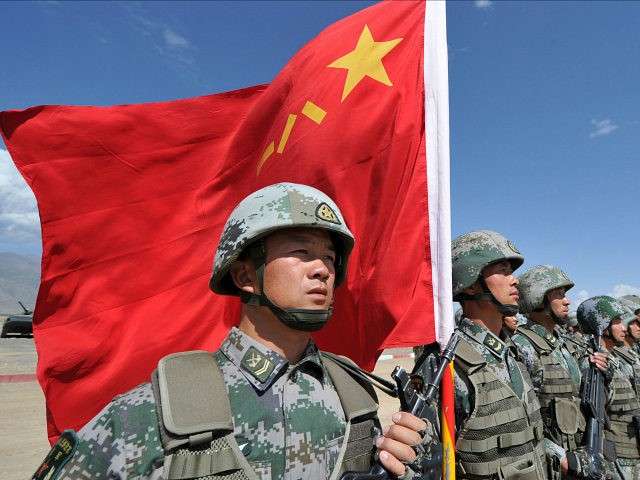China is reportedly moving missile defense batteries and troops closer to its border with North Korea, a potential sign that Beijing anticipates either a large refugee wave north or a military disturbance triggered by the belligerence of communist dictator Kim Jong-un.
The South Korean newspaper Chosun Ilbo cited Radio Free Asia (RFA) in a report Monday, stating that RFA had compiled evidence that China had “late last year deployed another missile defense battery at an armored division in Helong, west of Longjing in the Yanbian Korean Autonomous Prefecture.”
The “North Korean source in China” speaking to RFA also noted that Pyongyang had observed the movement of 300,000 troops closer to the North Korean border and “missile defense batteries near North Korean reservoirs by the Apnok and Duman rivers.” The batteries would prevent the violent outpouring of those reservoirs into China in the event of an airstrike.
On Friday, China’s state-run People’s Daily newspaper reported that Beijing was also investing in establishing nuclear monitoring stations throughout the world, but especially near North Korea, to more rapidly gather information about a potential airstrike. While carefully noting that “detection is not targeted at any particular country,” the newspaper noted that the planned 11 nuclear monitoring stations “are responsible for detecting nuclear activities in neighboring countries, including North Korea.”
The People’s Daily claims the monitor plan “shows China’s commitment to global nonproliferation.” Taken in tandem with reports of military movements near North Korea, however, this development indicates concern that a major military or political event in North Korea will impact China significantly.
Another state newspaper, the Global Times, remarked on U.S. President Donald Trump’s State of the Union address last week that “risks of US military action are growing.” Trump singled North Korea out as the world’s most egregious human rights abuser, celebrating the plight of North Korean refugees who risked their lives to escape.
In December, Chosun Ilbo reported that China is not only using its military assets to prepare for a potential catastrophe in North Korea; the newspaper cited Japanese media that had revealed evidence of China’s building massive refugee camps near the North Korean border, some that could welcome up to half-a-million refugees. Officials reportedly ordered the construction of such camps in Jilin, the same city where state media published a citizens’ guide to surviving a nuclear war triggered by North Korea.
The state-run Jilin Daily published an article in December suggesting citizens “close their windows and doors during an emergency and immediately take a shower and wash out their mouths and ears after being exposed to radiation.” It mentioned potential regional tensions without blaming North Korea directly.
While state media remained subtle about government fears regarding North Korea, communist academics made clear in December that they believed Kim Jong-un’s regime could not be trusted to keep China out of a major regional war.
“North Korea is a time bomb,” remarked Professor Shi Yinhong. “We can only delay the explosion, hoping that by delaying it, a time will come to remove the detonator.”
China, North Korea’s largest trade partner, almost single-handedly keeps Kim’s economy afloat. Through a tense year for Kim and President Trump, who has not shied away from challenging the autocrat, China stuck by North Korea, increasing trade to the fellow communist country. Beijing has abided by some United Nations sanctions, however, and forced businesses on North Korea’s border to limit their contact with the regime.
According to Radio Free Asia, businesses along the border “are now being severely hurt as wider customs controls are established along the border, sources working in the area say.” Many of these businesses traffic in goods that are not obvious candidates for sanctions, such as cosmetics and paper. RFA suggests that those impacted on the ground have soured on North Korea’s government, as its belligerence has triggered the sanctions.
Dictator Kim Jong-un has rejected all attempts by the global community to convince the country to abandon its illegal nuclear weapons program and has continued testing ballistic missiles and suggesting that their ultimate destination will be the United States.
On the other side of the border, RFA reported that Pyongyang is “stirring up anti-China sentiment among ordinary citizens through conferences and lecture sessions as the closed, authoritarian country’s economy bears the brunt of tough new economic sanctions supported by its longtime ally.” North Korea rarely confronts China on international platforms, but even this line was crossed in 2017, when the Korean Central News Agency accused China, without naming the country, of “dancing to the tune of the U.S.” by agreeing to abide by U.N. sanctions.

COMMENTS
Please let us know if you're having issues with commenting.